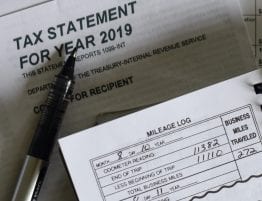
The IRS conducts examinations of certain tax returns in order to ascertain compliance with tax laws. Usually, only a small percentage of tax returns are audited. In 2022, the agency audited 3.8 out of every 1,000 income returns, which is a rate of 0.38%. Even though most taxpayers are unlikely to get audited, it helps to know what triggers an IRS audit just in case the IRS comes knocking.
Unreported Income: A Major Red Flag for the IRS
Unreported income is a big red flag for the IRS. The taxpayer may receive a notice/letter from the IRS concerning the unreported income, or the tax agency may request a face-to-face interview with the taxpayer, as the case may be. The IRS can gather financial and tax information of taxpayers from third-party sources and receives copies of Form 1099 and Form W-2. If the IRS finds that the taxpayer received income but did not report it on their tax return, they may conduct an audit.
High Earnings: Why the Wealthy Face Higher Audit Rates
Those with high earnings are audited more frequently. In 2022, individuals with Adjusted Gross Income (AGI) of $10,000,000 or more were audited at a rate of 18.79%, while those with AGI of over $5,000,000 were audited at a rate of 10.46%. The average audit rate for groups with AGI under $200,000 was below 1%. If you are a high earner, there is a higher likelihood of being audited, especially if there are discrepancies and errors on your tax return or if there were instances of non-compliance previously. Sudden income hikes are also closely scrutinized by the IRS.
Large Deductions: Catching the IRS’ Attention and Avoiding Pitfalls
Large deductions on a tax return catch the IRS’ attention. Before taking big deductions or too many deductions, taxpayers need to meet the qualifying criteria of each deduction they claim and keep excellent records. For example, if there are issues with unreported alimony, errors in claiming child support as deductible alimony, or unreported property settlements, the return may be audited by the IRS.
Errors on a Return: How Mistakes Can Trigger an Audit
Though not all returns with errors are audited by the IRS, an audit may ensue if the agency believes that the errors were intentional or they find discrepancies in the return when examining the errors. Usually, the IRS corrects simple math errors themselves and sends a letter to the taxpayer to inform them of the corrections. However, in the case of errors that significantly affect the tax bill, the IRS may initiate an audit.
Unreported Virtual Currency Earnings: Navigating Tax Obligations in the Digital World
According to the IRS, “For federal tax purposes, virtual currency is treated as property. General tax principles applicable to property transactions apply to virtual currency transactions.” If a taxpayer receives virtual currency as payment for goods or services, they need to include the fair market value of the virtual currency in U.S. dollars as of the date the virtual currency was received when calculating gross income. The IRS is increasingly making enforcement efforts to tax income from virtual currencies, making unreported income from virtual currency an important trigger for an audit.
False Credits: Beware of Claiming Ineligible Tax Credits
Taxpayers should ensure that they meet the qualifying criteria for the tax credits they claim on their return. Some taxpayers use credits they do not qualify for to reduce their tax bills. The IRS may initiate an audit if they find false credits on a return.
How the IRS Selects Returns for an Audit: Methods Used to Determine Examination
Even if a tax return has no errors, false deductions or credits, unreported income, and other similar red flags, it may still be audited. The IRS uses various methods to select returns for an audit:
Computer Scoring
Sometimes, returns are selected for an audit based on a computer system that gives each return a score. The computer system known as the Discriminant Function System (DIF) presents a score that suggests a potential for change based on past IRS experience with similar returns. After the computer system has selected returns for a potential audit, the IRS examines the returns with the highest scores.
Information Mismatch
Returns that do not report income correctly risk being audited. If there is an income mismatch because the payer reports from Form W-2 or Form 1099 do not match the income reported on the return, an audit may be conducted to conduct further inspection.
Related Audits
The IRS may audit people related to the taxpayer being audited, such as the business partner, spouse, or investor, if they had financial and business transactions between them.
Navigating Audits with Confidence: Tips for Taxpayers to Handle IRS Inquiries
Though an audit sounds fearful to most, it is often simply sharing a few receipts or financial statements with the IRS remotely. While it’s important to be aware of the triggers that may increase your risk of an audit, it’s equally important to maintain accurate records and comply with tax laws.
By following the guidelines, taxpayers can keep financial and tax records, usually of the past three years, so that any inquiry by the IRS can be handled without worry. Remember, a little carefulness when preparing tax returns can go a long way in keeping away tax audits.








